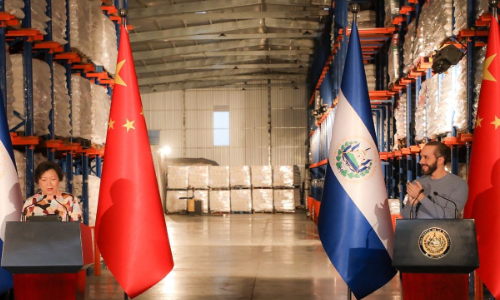
Commerce Ministry
China and El Salvador are ready to start bilateral free-trade agreement (FTA) negotiations at an early date and make joint efforts for the early conclusion of a deal, a spokesperson of China's Ministry of Commerce (MOFCOM) said on Thursday.
"In recent years, bilateral trade has grown substantially, which demonstrates the resilience and potential of bilateral economic and trade cooperation," the spokesperson said. Since the establishment of diplomatic ties, the two nations have effectively pushed for deeper, more solid and fruitful economic and trade cooperation in various fields, the spokesperson added.
The remarks by the spokesperson were in response to a media question: Given that the El Salvador government had abolished the "FTA" with the island of Taiwan, what is the Chinese mainland's plan on deepening economic and trade cooperation with El Salvador?
Nayib Bukele, president of El Salvador, said the country will continue to promote diplomatic relations with "sister countries" such as China, read a statement released by the Information Secretariat of the President of the Republic of El Salvador on Wednesday.
"We have started negotiations in order to sign an FTA between China and El Salvador as soon as possible," said Bukele, adding that the FTA will generate economic opportunities for his country.
Chinese Ambassador to El Salvador Ou Jianhong tweeted on Thursday that "we believe that the future China-El Salvador FTA will benefit the two countries and peoples."
"The Chinese side is willing to work hand in hand with the Salvadoran side, in order to promote prompt negotiations, so as to unite the economic, commercial and investment ties of the two countries," Qu said.
The joint announcements demonstrate the common will of China and El Salvador to deepen bilateral relations and upgrade the level of economic and trade cooperation, Zhao Lijian, a spokesperson of China's Foreign Ministry, said on Thursday.
"China highly appreciates the decision made by the El Salvador side to stand on the right side of history and serve the fundamental and long-term interests of the two countries," said Zhao, responding to a question on the statement made by the Supreme Court of Justice of El Salvador on Monday, which voided protective measures against El Salvador's "FTA" with the island of Taiwan.
The move marked the complete abolition of the "FTA" between El Salvador and Taiwan island. It demonstrates once again that adherence to the one-China principle is the general interest of the world and the trend of the times, and "no force can stop it", he noted.

El Salvador President Nayib Bukele (R) announces the start of negotiations for the Free Trade Agreement with the People's Republic of China on November 9, 2022. Chinese Ambassador to El Salvador Ou Jianhong (L) confirms the announcement. Photo: Information Secretariat of the President of the Republic of El Salvador
China and El Salvador established diplomatic relations on August 21, 2018.
"Relevant talks on pushing a China-El Salvador FTA actually started in early 2019, when the government of El Salvador announced the cancellation of its 'FTA' with Taiwan island. But it can't take effect until the Supreme Court approves it," Jiang Shixue, professor and director of the Center for Latin American Studies at Shanghai University, told the Global Times on Thursday.
After establishing diplomatic ties, the two countries signed relevant documents on the China-proposed Belt and Road Initiative cooperation in November 2018, and now they are discussing the FTA. Bilateral relations and economic and trade exchanges will surely be taken to a new level, Jiang said.
Over the past four years, China and El Salvador have witnessed fruitful results of cooperation. It is expected that the construction of the Port of La Libertad will be completed at the beginning of next year.
Work on the National Library in El Salvador has begun, and the design plan for the National Stadium and its construction are about to begin, Ou said earlier.
In 2021, bilateral trade grew 55.9 percent year-on-year to $1.73 billion, according to data from Chinese customs.
Global Times





